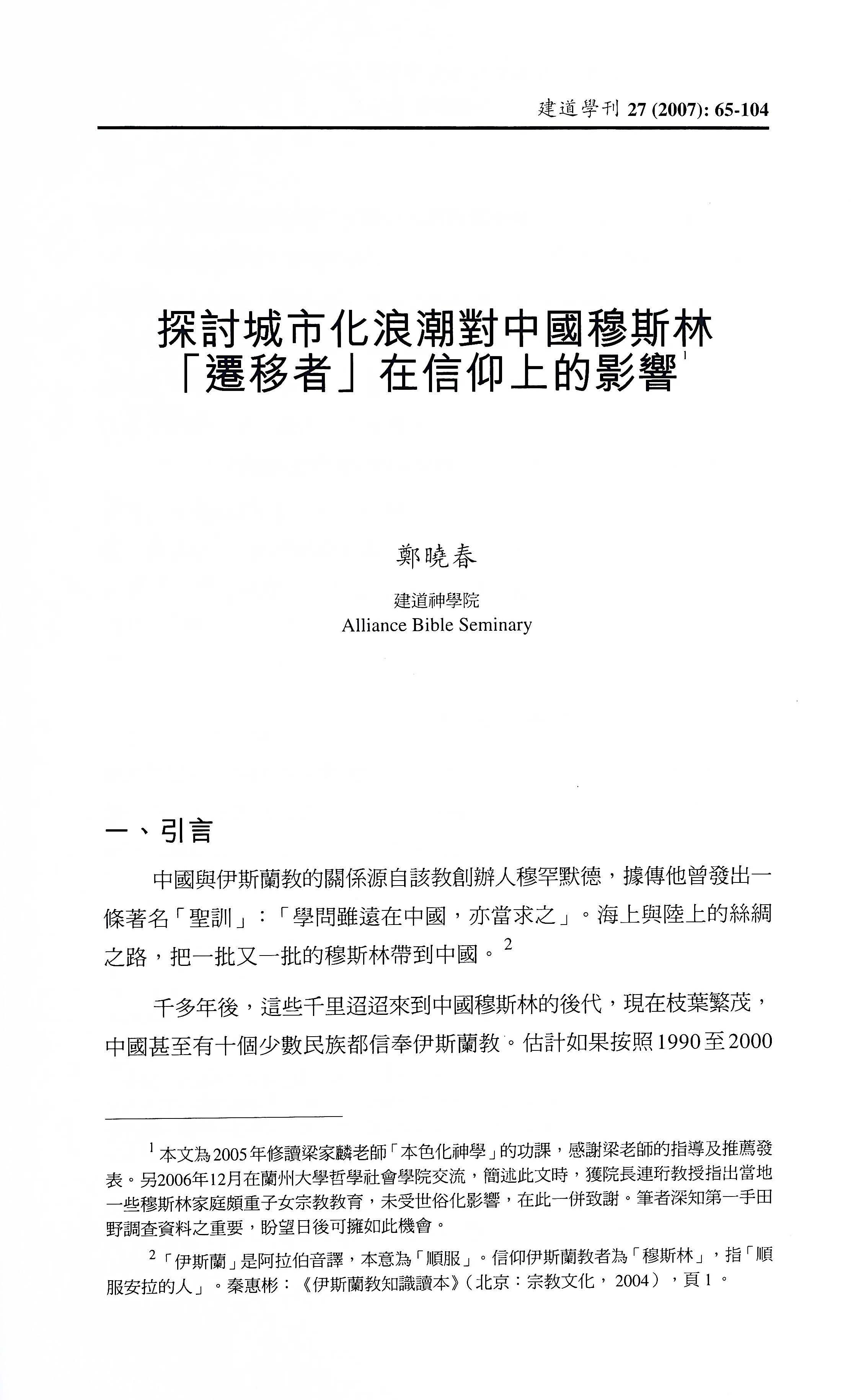探討城市化浪潮對中國穆斯林「遷移者」在信仰上的影響 /鄭曉春
撮要
中國城市化對兩千萬少數民族穆斯林在信仰上有何影響呢?筆者嘗試將受「遷移」影響者分為三類,並希望在宣教上能對症下藥:
城中人:因城市規劃而被迫在同一個城市中遷徙者。研究發現世居在都市中的年輕穆斯林,在世俗化以及家庭核心化的影響下,他們的信仰漸形淡化,成了最佳的傳福音對象。
雙城人:帶著資本或知識,從一個城市走進更先進的城市者。他們看來是伊教信仰的忠堅者。這與我們向來以為他們一旦脫離了原居地的宗教規範,會較容易接受基督信仰的看法有異。一旦遇到這些恪守信仰的雙城人,相信也需要熟悉伊教的教義,與基督教的異同,才有對話的空間。
城外人:因生計從農村走進城市者。筆者將之分為兩類,走入近文化及相對的異文化。前者面對的衝擊較小,故改變信仰的機會比走進異文化的穆民小些。 他們絕大部分的教育水平不高,傳福音時該注重如何立體地傳講。
ABSTRACT
What has urbanization done to the twenty thousand Muslims in China? This paper aims at exploring the mobile Muslims in terms of three categories, and thus shedding light on how Christians can preach the gospel of Christ to this particular group effectively.
The first group refers to those who are forced to disperse within a city because of the city planning. Research has shown that these young Muslims are under the influence of secular values as well as nuclear family setting, which affects the belief of the young Muslims. Thus they will become the target group to be evangelized.
The second group means those who move from one city to another with their capital and knowledge. They are regarded as the faithful Muslims. The situation is rather different from what we have presupposed that they are more ready to accept Christianity once they are away from home with strong religious ties. Christians should grasp the doctrines of Islam as well as the differences between Christianity and Islam in order to open a dialogue between Christians and Muslims.
There are two groups of people who move from villages to cities because of earning a living. The first group lives under the near-culture while the second group resides in a quite different culture from their own. The first type of city residents face relatively little challenges. Thus, they are not very likely to change their belief compared to those in the second group. Most of the Muslims in the first group are not educated, that is why we need to present the Bible messages to them in a more lateral way.
原載於《建道學刊》27期(2007年1月),頁65-104。
Latest Articles
新手牧者研究計劃(三):新手牧者的身心靈狀態 / 盧慧儀
2025 年 11 月 19 日
個體與關係:滕近輝思想中「深化」的靈性觀 / 倪步曉
2025 年 11 月 18 日
香港九龍塘基督教中華宣道會之起源和發展史/陳智衡
2025 年 10 月 20 日
Highlights
[電子書]困境與抉擇:「建道研究中心30週年誌慶」跨學科研討會論文集/廖炳堂、倪步曉主編
2025 年 1 月 2 日
從梧州到長洲:建道神學院125年的挑戰與恩典 / 陳智衡
2023 年 10 月 1 日
微小教會的見證/高銘謙
2023 年 6 月 1 日







